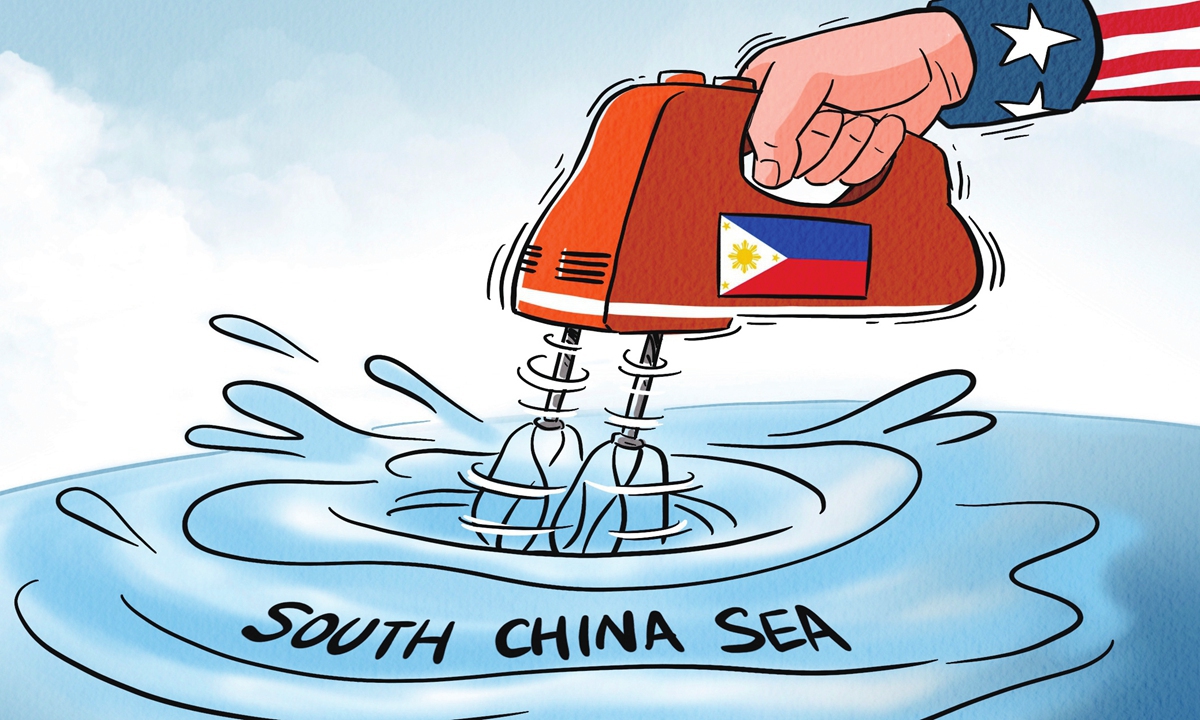
Illustration: Liu Rui/GT
With the approach of the 8th anniversary of the illegal award on the South China Sea arbitration,
mk some troubling developments have recently emerged in the region. A number of extraterritorial countries have increased their military activities in the South China Sea, and the Philippines has ratcheted up legal motions and maritime actions aimed at solidifying this arbitration award. Certain countries have intensified unilateral actions to consolidate and expand their vested interests.
In less than two years, the current Philippine government has nearly dismantled the good practices established over recent years for managing maritime differences and properly handling the South China Sea issue between China and the Philippines. The bilateral relationship, which had gradually emerged from the shadow of the illegal South China Sea arbitration case, now appears to have reset and is even regressing.
The international community is widely aware of China's position of not accepting or recognizing the award. However, some countries have not fully grasped the significant damage and harm that the award has caused to the handling of the South China Sea dispute, the rule-building in the region, the fairness and authority of international dispute settlement mechanisms, and the international order based on international law. Some even harbor unrealistic fantasies about the award.
Judging from the current provocative actions of the Philippines against China's rights and claims in the South China Sea, the current Philippine government has intensified its use of the award to change the status quo, consolidate illegal gains and expand the scope of infringement. Since taking office, Philippine President Ferdinand Marcos Jr. has frequently cited the award as a so-called "basis" to attack and smear China's actions of safeguarding legitimate rights at the Ren'ai Jiao and Huangyan Dao. In fact, the arbitration award contains significant errors and flaws in legal interpretation and application, fact-finding and evidence acceptance. China's stance is precisely an act of maintaining its legitimate rights and interests, maintaining maritime peace and stability and upholding the rule of law.
Looking back at the volatile situation in the South China Sea since the award was issued eight years ago, it can be asserted that the award has not brought, and indeed cannot bring, peace and tranquility to the South China Sea. The arbitration award has become a "troublemaker" for peace and stability in the South China Sea, a "spoiler" for bilateral relations between China and relevant parties, and a "roadblock" for the comprehensive and effective implementation of the Declaration on the Conduct of Parties in the South China Sea and the orderly advancement of consultations on the Code of Conduct in the South China Sea.
We must recognize that the arbitration award has had an extremely negative impact on political mutual trust at all levels between China and the Philippines. Outside the Philippines, some other disputant sides also occasionally refer to or cite the arbitration award as the basis for their respective claims. Additionally, some extraterritorial countries hold the arbitration award as a standard, pressuring the Chinese government to "respect" or "implement" the award. Therefore, it is crucial to make relevant countries within and outside the region clearly understand the essence and dangers of the award, and to promote the relevant parties to return to the correct track of resolving disputes through negotiation and consultation, mitigating differences through maritime cooperation and managing crises through rule-building.
As for the Philippines' threat to initiate new arbitration against China, it is, in a sense, a manifestation of the lingering toxicity of this arbitration award. No matter how the Philippine government packages the so-called "second arbitration," its content will definitely be related to some errors in the previous arbitration award. China has indisputable sovereignty over the South China Sea islands and the adjacent waters. It needs to repeatedly and continuously clarify the toxicity of the arbitration award from a legal standpoint to thoroughly eradicate this "tumor" that has long undermined the rule of law and order at sea.
Rebutting the arbitration award and countering the erroneous statements of countries within and outside the region are not intended to provoke a new round of legal battles, but to make a rightful response to actions and forces that disrupt peace and stability in the South China Sea, interfere with China-Philippine relations and profit from the award. This will further reveal to the international community the political background of the arbitral tribunal's composition and the historical errors of the arbitration award, and lay bare the irreversible severe harm the award has caused to the rule of law and maritime order.
The author is the chairman of the Huayang Research Center for Maritime Cooperation and Ocean Governance and founding president of the National Institute for South China Sea Studies. opinion@globaltimes.com.cn

